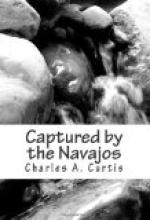“To the north there is a trail to Abiquiu, rarely used, and to the west there is only La Puerta, into which all the other trails from the east and south concentrate. It is to watch La Puerta that this camp was established.”
“And you say you have seen no Navajos or signs of them since you came?”
“Yes, plenty of signs, but no Indians. Parties have passed here in the night, but none were driving stock.”
I learned all I could of the captain while his men hurried their baggage into the wagons, but he was too much excited over the prospect of leaving the Great Valleys, as well as curious to know of events in Santa Fe, to give me much information. When the guard of regulars relieved the volunteer guard, I placed my sentinel on a beat a dozen yards in rear of the guard-house, which enabled him to see several hundred yards back of the ridge, and yet not show himself prominently to an approaching foe.
The volunteers at last marched away, and I made a casual examination of the cabins. I noticed that the inner surface of the log walls had been hewn smooth, and the names, company, and regiment of the former occupants had been carved with knives or burned in with hot pokers along the upper courses. Each had a wide, open, stone fireplace and chimney set in one corner, after the Mexican fashion.
No uniform design had been observed in the construction of the cabins, the occupants having followed their own ideas of what would prove comfortable. Height, width, and depth were variable, but their fronts were in perfect alignment.
The hut which had been occupied by the officers and which fell to the boys and myself was at the right of the line, next the storehouse, a little removed from the others. It was twenty by twenty feet, partitioned on one side into two alcoves in which were rude bedsteads, one of which was assigned to the boys and one to myself. A door opened on the south side, and a window, the only glass one in camp, looked out upon the parade. Floors in all the cabins were of earth, raised a foot higher than the outside surface of the ground, smoothed with a trowel and carpeted with blankets, until later, when skins of wild animals took their place. Doors were made of puncheons, swung on wooden hinges and fastened with wooden latches operated by latch-strings.
Our first day in camp was principally spent in making ourselves comfortable. The men were busy in filling bed-sacks from the hay-stacks, and in repairing the cabins and articles of furniture. Ten head of beef cattle had been turned over to me with the other property of the camp. I had placed them in charge of a soldier, with orders to herd them in the valley immediately in front of the opening, where they could be plainly seen from the parade as well as the guard-house.
At noon two Mexican hunters, father and son, rode up to my door, the former mounted on a mule and the latter on a burro, or donkey. The elder said their names were Jose and Manuel Cordova, of Canoncito, that they were looking for deer, and would like permission to make the camp their place of rendezvous. I gave them permission to do so, and their animals were turned loose with our stock.




